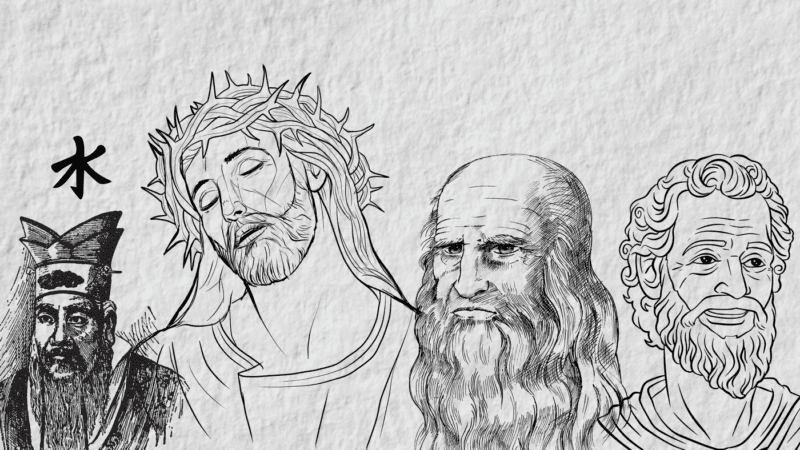
Share Post:
Influence shapes the course of history through the actions and ideas of remarkable individuals.
This list highlights twelve people whose contributions have profoundly impacted society, culture, and the world at large, spanning from ancient times to the contemporary era.
Each figure exemplifies how one person’s vision can transform the world.
Table of Contents
Toggle1. Jesus Christ
- Date of Birth: 4-6 BC
- Date of Death: 30-36 AD
- Place of Birth: Bethlehem, Judea
- Key Contributions:
- Founder of Christianity
- Teachings on love
- Forgiveness
- Salvation
Jesus’ messages of love, forgiveness, and salvation offered a radical departure from the prevailing religious doctrines of his time.
His life and death, particularly his crucifixion and resurrection, are cornerstone events celebrated by Christians worldwide.
Christianity, with more than 2 billion followers, is the largest religion globally. The teachings of Jesus Christ have not only influenced religious beliefs but also:
- Western culture
- Laws
- Ethics
His parables and sermons, such as the Sermon on the Mount, emphasize humility, charity, and compassion, which continue to inspire and guide individuals and societies.
2. Aristotle
- Date of Birth: 384 BC
- Date of Death: 322 BC
- Place of Birth: Stagira, Greece
- Key Contributions:
- Philosophy
- Logic
- Metaphysics
- Ethics
- Politics
- Natural sciences
Aristotle, the ancient Greek philosopher, is a towering figure in Western philosophy and science. A student of Plato and the tutor of Alexander the Great, Aristotle made groundbreaking contributions across numerous fields.
His works, such as “Nicomachean Ethics,” “Politics,” and “Metaphysics,” have laid the foundational principles for many disciplines.
In natural sciences, Aristotle’s observations and classifications of living organisms set the stage for future biological studies, influencing scientists for centuries.
In ethics, Aristotle introduced the concept of virtue ethics, which focuses on the development of virtuous character traits.
His political theories advocated for the rule of law and the role of the middle class in achieving political stability, ideas that have influenced modern democratic thought.
3. Confucius
- Date of Birth: 551 BC
- Date of Death: 479 BC
- Place of Birth: Qufu, Lu State (modern-day Shandong, China)
- Key Contributions:
- Teachings on morality
- Social relationships
- Justice
- Sincerity
Confucianism, the philosophical system based on his ideas, has deeply influenced Chinese society and other East Asian cultures for over two millennia.
Central to Confucius’ philosophy is the concept of “Ren” (benevolence or humaneness), which emphasizes compassion and empathy in interpersonal relationships.
He also introduced the idea of “Li” (ritual propriety), advocating for a harmonious social order through adherence to rituals and traditions. His teachings stress the importance of family, respect for elders, and the cultivation of virtue.
Confucius believed that education and self-cultivation were essential for personal development and social harmony.
His emphasis on lifelong learning and the moral responsibilities of rulers and citizens has shaped educational and governance systems in China and beyond.
The Confucian ideal of the “gentleman” (junzi) as a morally upright and learned individual remains a model of personal conduct.
4. Leonardo da Vinci
- Date of Birth: April 15, 1452
- Date of Death: May 2, 1519
- Place of Birth: Vinci, Republic of Florence (Italy)
- Key Contributions:
- Renaissance art
- Science
- Anatomy
- Engineering
Leonardo da Vinci was a Renaissance polymath whose contributions to art, science, and engineering have left an indelible mark on history.
However, his influence extends far beyond painting, encompassing groundbreaking work in anatomy, engineering, and scientific observation.
Leonardo’s approach to art was deeply intertwined with his scientific inquiries. His detailed anatomical drawings, based on meticulous dissections, advanced the understanding of human physiology and inspired future medical research.
His notebooks, filled with sketches and writings on topics ranging from hydraulics to aeronautics, demonstrate his relentless curiosity and inventive genius.
As an engineer, Leonardo conceptualized numerous devices, including early versions of the helicopter, tank, and parachute.
5. Isaac Newton
- Date of Birth: January 4, 1643
- Date of Death: March 31, 1727
- Place of Birth: Woolsthorpe Manor, Lincolnshire, England
- Key Contributions:
- Laws of motion
- Universal gravitation
- Calculus
Isaac Newton, an English mathematician, physicist, and astronomer, is a pivotal figure in the history of science.
His formulation of the laws of motion and universal gravitation revolutionized the understanding of the physical world and laid the foundation for classical mechanics.
Newton’s work in mathematics, particularly the development of calculus, has had a profound and lasting impact on various scientific disciplines.
Newton’s seminal work, “Philosophiæ Naturalis Principia Mathematica” (Mathematical Principles of Natural Philosophy), published in 1687, is one of the most influential books in the history of science.
In it, he described the three laws of motion that govern the movement of objects and formulated the law of universal gravitation, which explains the gravitational attraction between masses.
These principles not only explained the motion of celestial bodies but also applied to everyday phenomena on Earth.
His development of calculus (independently of Leibniz) provided a powerful mathematical framework for analyzing changes and motion, enabling further scientific and engineering advancements.
6. Siddhartha Gautama (Buddha)
- Date of Birth: circa 563-480 BC
- Date of Death: circa 483-400 BC
- Place of Birth: Lumbini, Nepal
- Key Contributions:
- Founder of Buddhism
- Teachings on enlightenment
- The Four Noble Truths
Siddhartha Gautama, known as the Buddha, was a spiritual leader and founder of Buddhism, one of the world’s major religions.
His teachings on the path to enlightenment, encapsulated in the Four Noble Truths and the Eightfold Path, have influenced millions of people and shaped philosophical and ethical thought across Asia and beyond.
Born a prince in Lumbini (modern-day Nepal), Siddhartha renounced his royal life in search of spiritual awakening.
After years of ascetic practices and meditation, he attained enlightenment under the Bodhi tree in Bodh Gaya, India.
As the Buddha, he spent the rest of his life teaching the principles of Dharma (truth) and guiding others on the path to enlightenment.
The Eightfold Path outlines a practical guide to ethical and mental development, aiming to end the cycle of rebirth and achieve Nirvana.
Buddhism emphasizes mindfulness, meditation, and ethical conduct, promoting a life of compassion and wisdom.
The Buddha’s teachings have given rise to diverse schools of thought, including traditions like:
- Theravada
- Mahayana
- Vajrayana
Each one comes with its own interpretations and practices.
7. George Washington
- Date of Birth: February 22, 1732
- Date of Death: December 14, 1799
- Place of Birth: Westmoreland County, Virginia, USA
- Key Contributions:
- First President of the United States
- Leader of the Continental Army
- Presided over the drafting of the U.S. Constitution
George Washington, known as the “Father of His Country,” played a crucial role in the founding of the United States.
As the first President of the United States and the leader of the Continental Army during the American Revolutionary War, Washington’s leadership and vision were instrumental in shaping the nation’s early political landscape and securing its independence.
Washington’s military career began in the Virginia militia, but his leadership during the Revolutionary War earned him national acclaim.
He led the Continental Army to victory against the British, enduring hardships such as the winter at Valley Forge and achieving decisive victories at battles like Trenton and Yorktown. His ability to inspire and unify his troops was key to the American victory.
After the war, Washington presided over the Constitutional Convention of 1787, where he played a pivotal role in the drafting and ratification of the U.S. Constitution.
As the nation’s first president, he set many precedents, including the establishment of a cabinet system and the tradition of a peaceful transfer of power.
Washington’s leadership extended beyond politics and military achievements.
He advocated for the fair treatment of Native Americans, supported infrastructure projects, and promoted education. His decision to voluntarily step down after two terms established a democratic precedent that influenced future leaders worldwide.
8. Napoleon Bonaparte
- Date of Birth: August 15, 1769
- Date of Death: May 5, 1821
- Place of Birth: Ajaccio, Corsica
- Key Contributions:
- French military and political leader
- Napoleonic Code
- Reshaped European politics
Napoleon Bonaparte, a military genius and political leader, rose to prominence during the French Revolution and became Emperor of the French.
His military campaigns and administrative reforms left a lasting impact on France and Europe.
Napoleon’s influence extended beyond the battlefield, reshaping European politics and legal systems.
Napoleon’s rise to power began as a successful general in the French Revolutionary Army. His strategic brilliance led to numerous victories, expanding French territory and influence. In 1799, he staged a coup d’état, establishing himself as First Consul, and later crowned himself Emperor in 1804.
One of Napoleon’s most enduring legacies is the Napoleonic Code, a comprehensive set of civil laws that modernized the French legal system.
The Code emphasized merit-based advancement, property rights, and the separation of church and state.
It served as a model for legal systems in many other countries, influencing legal thought worldwide.
His conquests and the subsequent redrawing of national borders led to significant geopolitical changes.
Despite his ultimate defeat at Waterloo in 1815, the principles of the French Revolution—liberty, equality, and fraternity—spread across Europe, inspiring movements for national independence and democratic reforms.
Although controversial, Napoleon’s influence on modern Europe is undeniable. His legacy is a complex blend of military prowess, administrative genius, and the spread of revolutionary ideals, securing his place as one of history’s most influential figures.
9. Mahatma Gandhi
- Date of Birth: October 2, 1869
- Date of Death: January 30, 1948
- Place of Birth: Porbandar, India
- Key Contributions:
- Leader of Indian independence movement
- Advocate of non-violent civil disobedience
Mahatma Gandhi, a leader of the Indian independence movement, is renowned for his philosophy of non-violent resistance, which inspired civil rights movements worldwide.
Gandhi’s commitment to truth and non-violence (Satyagraha) played a crucial role in India’s struggle for independence from British rule.
Born in Porbandar, India, Gandhi studied law in London and worked in South Africa, where he developed his ideas on civil rights and social justice.
Upon returning to India, he became a prominent leader in the Indian National Congress, advocating for Swaraj (self-rule) through non-violent means.
Gandhi’s methods included peaceful protests, boycotts, and civil disobedience. Notable campaigns, such as the Salt March in 1930, challenged oppressive British laws and mobilized millions of Indians.
His emphasis on non-violence and civil resistance provided a moral framework that distinguished the Indian independence movement.
Gandhi’s influence extended beyond politics. He promoted social reforms, including the eradication of untouchability, the empowerment of women, and rural self-reliance. His simple lifestyle and emphasis on self-sufficiency resonated with many and underscored his commitment to living his principles.
Gandhi’s legacy of non-violence inspired leaders like Martin Luther King Jr., Nelson Mandela, and Cesar Chavez in their respective struggles for civil rights and social justice.
10. Albert Einstein
- Date of Birth: March 14, 1879
- Date of Death: April 18, 1955
- Place of Birth: Ulm, Germany
- Key Contributions:
- Theoretical physicist
- Theory of relativity
- Contributions to quantum mechanics
Albert Einstein, one of the most renowned scientists of the 20th century, revolutionized the field of physics with his theories of relativity and contributions to quantum mechanics.
His work not only transformed the scientific understanding of the universe but also had profound implications for technology and philosophy.
Einstein’s theory of special relativity, published in 1905, introduced the concept that the laws of physics are the same for all non-accelerating observers and that the speed of light is constant regardless of the observer’s motion.
In 1915, Einstein published his general theory of relativity, which expanded on special relativity and provided a new understanding of gravity. He proposed that gravity is not a force between masses but a curvature of spacetime caused by the presence of mass.
This theory has been confirmed by numerous experiments and observations, such as the bending of light by gravity and the precise orbit of Mercury.
Einstein also made significant contributions to quantum mechanics, particularly the concept of the photon and the photoelectric effect, for which he received the Nobel Prize in Physics in 1921.
His work laid the groundwork for the development of quantum theory, which describes the behavior of particles at the atomic and subatomic levels.
The Bottom Line
The twelve individuals highlighted in this list exemplify the profound impact that visionary leaders can have on the world.
Through their unique contributions to religion, philosophy, science, politics, and social justice, they have shaped human history and left an enduring legacy that continues to influence and inspire future generations.
If you find this interesting, read 10 Largest Castles in the World.






